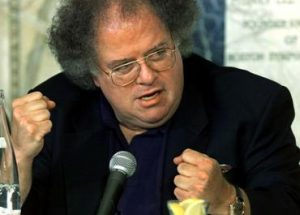James Levine, one of the world’s most acclaimed conductors who served as music director for the Metropolitan Opera in New York for four decades before sexual abuse accusations prompted a messy exit, has died at age 77.
Dr. Len Horovitz, his personal physician, said Levine died on March 9 in Palm Springs, California, of “natural causes”.
The maestro, known for his wild hair and bespectacled face, was long revered by the Met’s audiences, singers and symphony-sized orchestra at America’s cathedral of opera whose standards he helped place among the highest in the world.

Levine, considered the foremost American conductor of his time and perhaps the most celebrated since Leonard Bernstein, led about 2,500 performances of more than 80 different operas since his Met debut in 1971, more than anyone else since it was founded in 1880.
He also conducted some of the major orchestras of America and Europe, most notably the Munich Philharmonic and the Boston Symphony Orchestra.
He stepped down as music director in 2016 after struggling with health problems, but was fired in 2018 from his reduced role with the Met after three men accused him of abusing them as teenagers as far back as 1968.
Levine and the Met, the largest performing arts organisation in the United States, reached an out-of-court settlement in 2019 resolving his lawsuit accusing the company of breach of contract and defamation and the company’s countersuit. The settlement called for him to get $3.5 million.
Peter Gelb, the Met general manager who made the decision to part ways with Levine, called the outcome “a tragedy.” Levine called the accusations “unfounded” and said he was not “an oppressor or an aggressor.”
Levine worked with the greatest opera singers of his era including Luciano Pavarotti, Placido Domingo, Renee Fleming, Anna Netrebko and Marilyn Horne.
Others are Jessye Norman, Samuel Ramey, Kathleen Battle, Frederica von Stade, Bryn Terfel, Roberto Alagna, Kiri Te Kanawa, Cecilia Bartoli, Renata Scotto, Leontyne Price and Grace Bumbry.
“He is one of the greatest artists of all time. He has created one of the greatest orchestras in modern history. He may be one of the greatest opera conductors who ever lived,” Gelb told the New York Times in 2011.
Levine was respected for his conducting abilities, his penchant for eliciting the finest performances from musicians and his endless enthusiasm.
A traditionalist, he conducted sparkling performances of venerable operas by composers including Verdi, Mozart, Puccini, Rossini and Wagner, as well as new compositions.
A piano prodigy, Levine remained active as a keyboard recitalist. He worked to create an exceptional rapport with his musicians.
During his career, he was bothered by health problems, notably a series of back operations. This forced him to cut back on performances and conduct while sitting down.
He injured his spine in a fall while on vacation in 2011 that required surgery and left him partially paralysed.
Complications related to Parkinson’s disease prompted Levine in 2016 to step down as the Met’s full-time music director and become music director emeritus, a position in which he would still conduct. His later suspension and dismissal ended that arrangement.
“I sometimes say that music chose me because I can’t remember my life without it,” Levine said in a PBS documentary.
“I feel music gave me a real continuum of creative, constructive life. … As I look around at other professions in the world, it seems that to have a life in music is the most beautiful life I could imagine”.
Levine was born in Cincinnati, Ohio, in 1943. He made his debut as a piano soloist at age 10 with the Cincinnati Symphony.
After studying at the Juilliard school of music in New York, he was invited in 1963 to serve as assistant conductor of the Cleveland Orchestra under prominent conductor George Szell.
He made his Metropolitan Opera debut in 1971, conducting Puccini’s Tosca. He was appointed the Met’s principal conductor in 1973, its musical director in 1975 and was given the expanded role of artistic director in 1986.
“The crisis of how to enact opera onstage visually has some alarming facets,” Levine once told New York magazine. “I’m referring to productions the composer and librettist would denounce.
“I’m speaking of a production that uses a piece instead of presents the piece. People will say, ‘Oh, Jimmy, he’s so fanatic.’ … But there are so many contemporary productions that just destroy the piece, for nothing.”
From 1996 to 2000, he also led more than a dozen concerts on the popular “Three Tenors World Tour,” with Domingo, Pavarotti and Jose Carreras. (Reuters)
